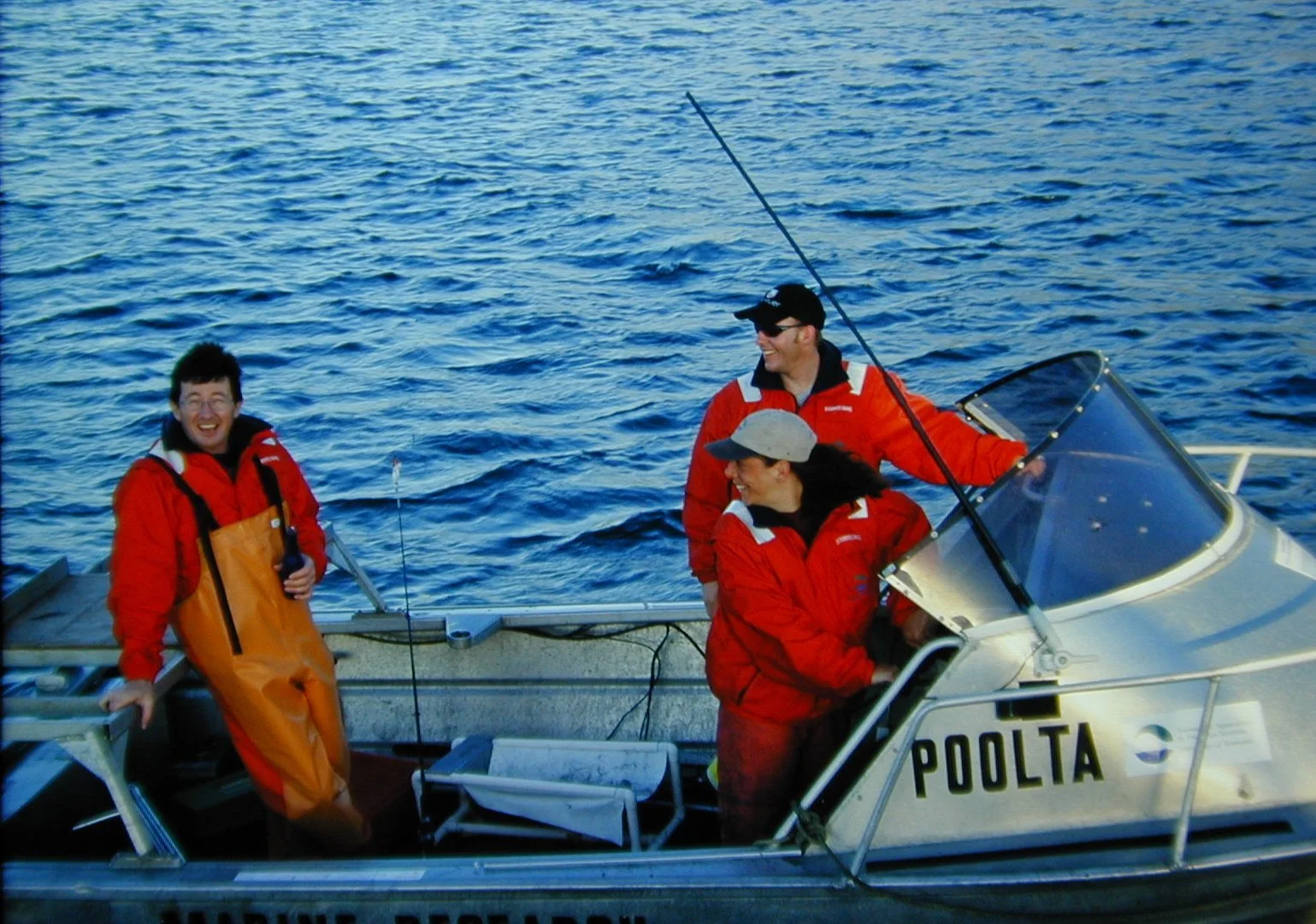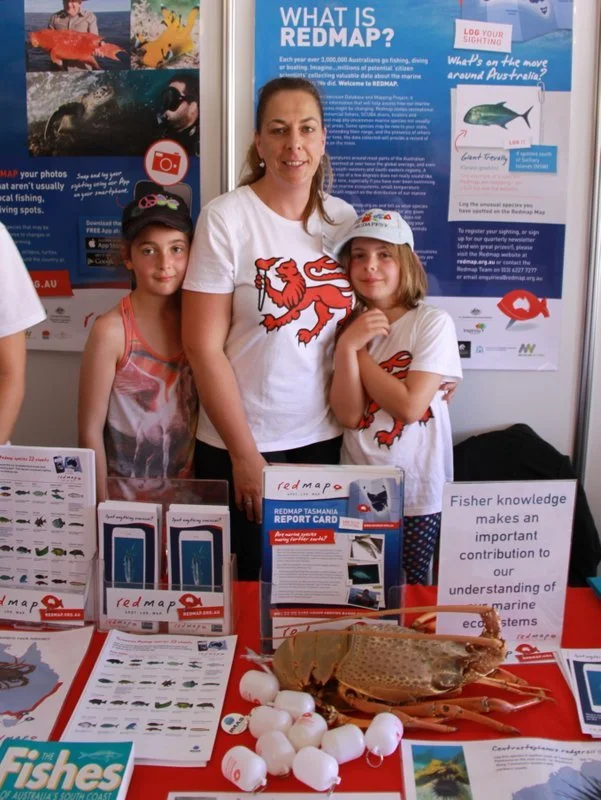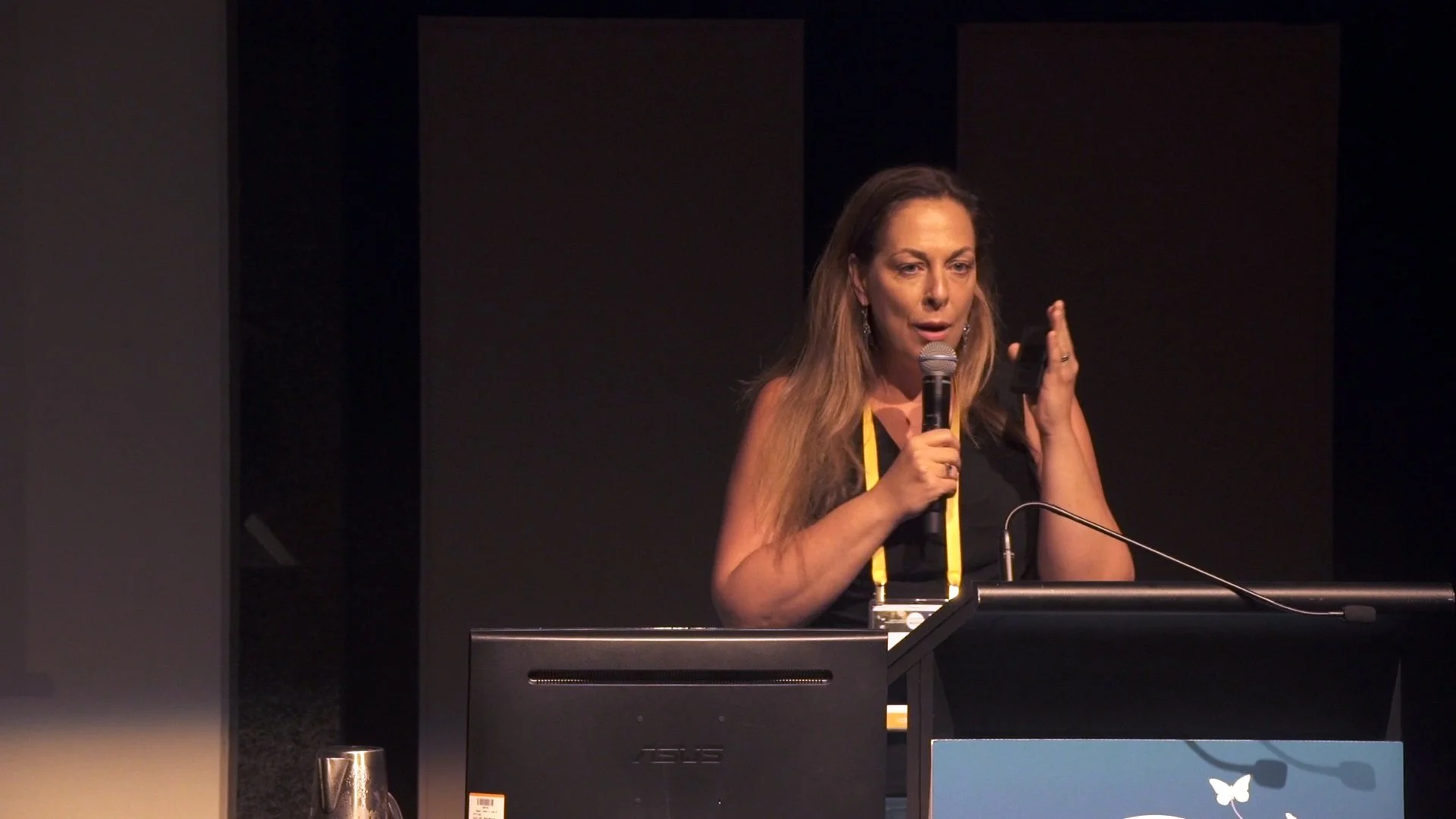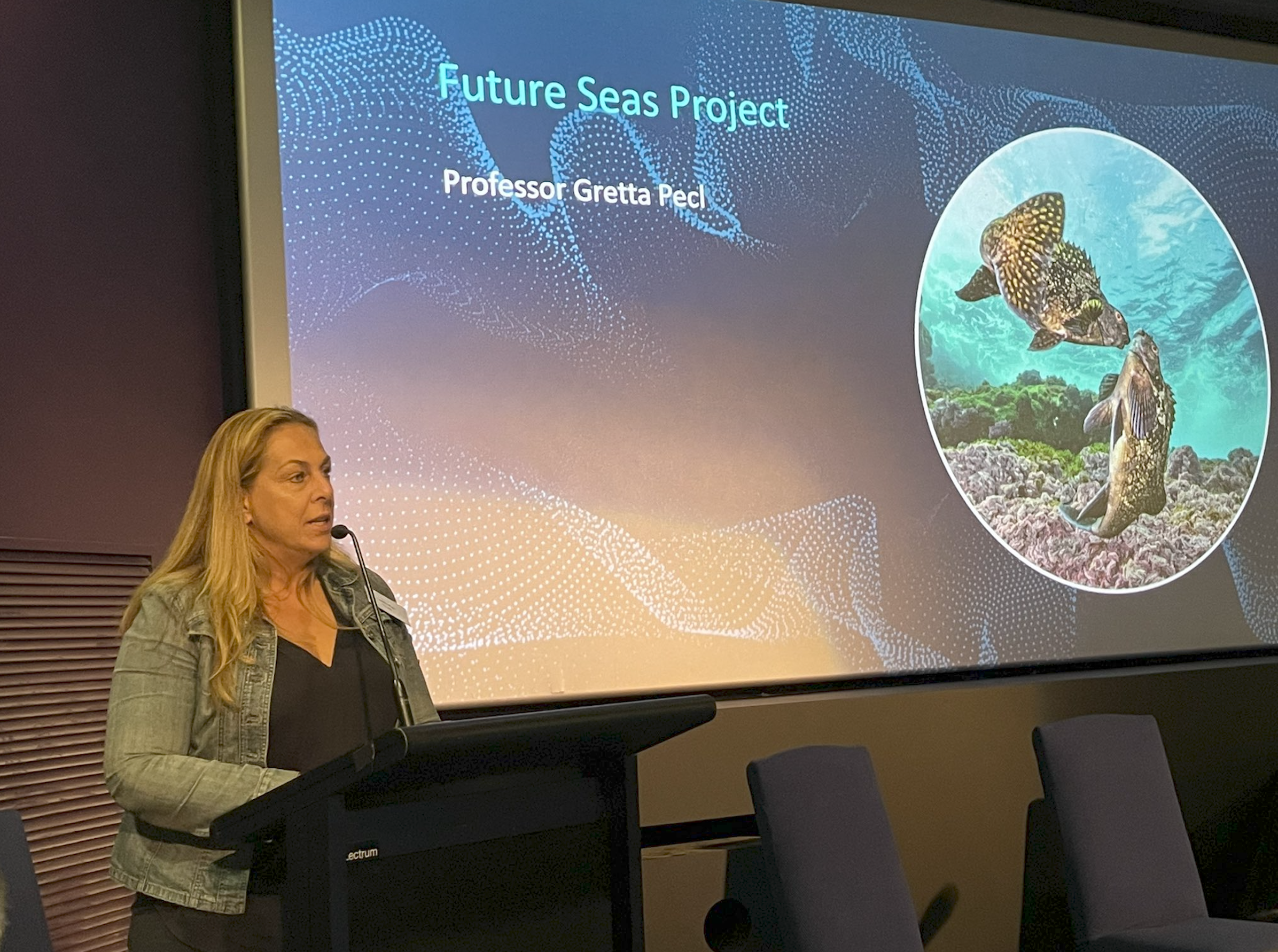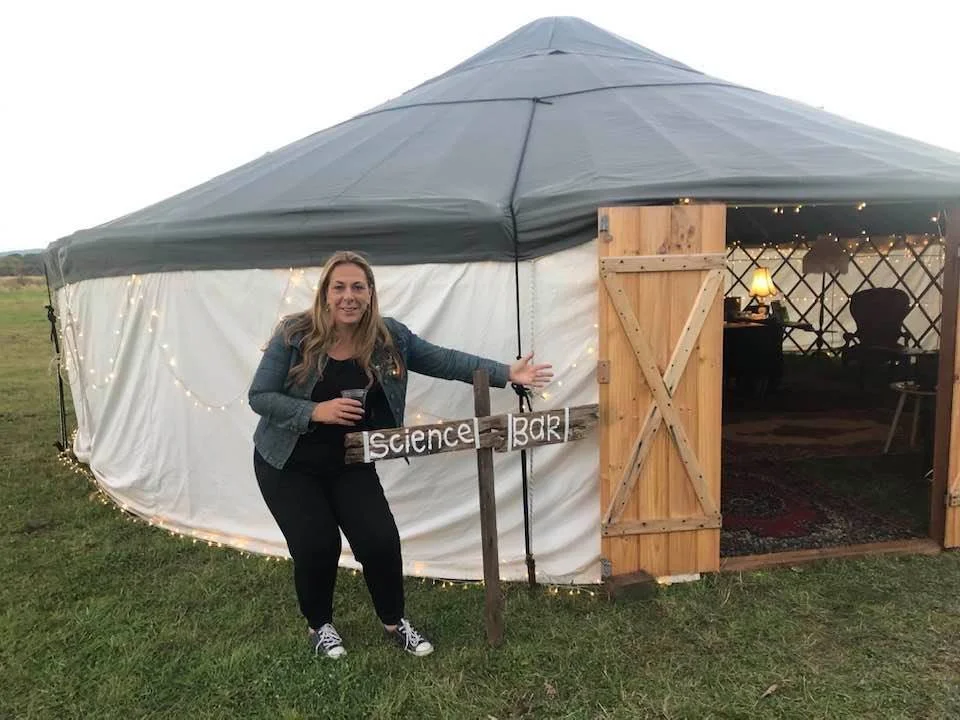gretta pecL
At the Forefront of Marine Climate Research
Professor Gretta Pecl is a marine ecologist renowned for her work focusing on species and ecosystem responses to climate change alongside her socioecological approaches to adapting natural resource management in a changing climate. With a strong passion and commitment to science communication, Pecl engages the public skillfully, leveraging both citizen science initiatives and community engagement to make ecological concepts both accessible and engaging.
Acknowledged as an Australian Research Council 'Future Fellow' and serving as a Lead Author for the IPCC's AR6 report, Pecl's expertise is widely recognised. As a key member of the Great Southern Reef Foundation Science Committee and Research Partnership, she currently holds the position of Professor of Marine Ecology at the Institute for Marine and Antarctic Studies (IMAS) and Director of the Centre for Marine Socioecology (CMS) at the University of Tasmania (UTAS). Her influential work continues to influence marine science, climate change research and she is frequently sought after for her insights in media stories, contributing articles, and making appearances in various television segments and interviews.
It started with squid
Professor Gretta Pecl's journey into marine biology began with an innate curiosity about the underwater world, particularly the behaviour and physiology of its inhabitants. It was this curiosity that initially led her to the study of squid, a creature as bizarre as it is fascinating.
During her PhD, she explored the life history of squid populations, focusing on how these change with latitude and temperature - a subject that inadvertently became a primer for her later work in climate change.
Early Career Insights
Pecl’s early career research involving extensive fieldwork brought her face to face with the direct impacts of a warming ocean. Here, on Tasmania’s East coast she observed new species appearing and local ecosystems changing - signs that would deeply influence her future research path.
Her research extended to the Tasmanian rock lobster fishery, where her focus was on summarising physiological data and understanding the impacts of climate change on the industry. The work involved analysing stock assessments and temperature projections, particularly in relation to reproductive sizes and the overall health of the lobster population. This comprehensive approach examined the different facets of the fishery, from stock assessment to management processes, identifying how climate change could intersect each area and exploring adaptation strategies for the industry.
The diversity of roles and projects throughout Pecl’s career, often pushing her beyond her comfort zone, honed her expertise for the multi-faceted challenges of climate change research. Over 18 years, she took on 12 different roles, gradually adopting an interdisciplinary approach that integrates ecological research with social science, a shift especially pronounced in her work on climate change adaptation. This progression in her career reflects her evolving understanding of the interconnectedness of marine ecosystems and human activities.
From Anecdote to Evidence
A pivotal aspect of Pecl's career has been her growing recognition of the crucial human element in marine biology - how actions and decisions above water can significantly affect life below. A defining moment in this journey was her project with Tasmanian rock lobster fishers, where she encountered contrasting views on climate change. Initially met with scepticism, fishers in a workshop setting shared observations of environmental changes that mirrored expected climate change impacts. This contrast highlighted the untapped potential of fishers' experiential knowledge, often overlooked in scientific research.
Simultaneously, Pecl had submitted a grant proposal to study population linkages of snapper on Tasmania’s north coast, a species increasingly reported in the area. However, the proposal was dismissed on the grounds that local fishers' observations were not considered 'scientific' evidence. This dismissal struck a chord with Pecl, illuminating the gap between local ecological knowledge and scientific data recognition.
REDMAP: Bridging Knowledge Gaps
Motivated by these experiences, Pecl conceived the Range Extension Database and Mapping Project (REDMAP). This innovative citizen science project aimed to bridge the gap between local observations and scientific data. It provided a platform where community members, including fishers, could submit photographic evidence of marine species sightings, particularly those outside their known range. These submissions would then be verified and incorporated into a scientific database, turning anecdotal observations into valuable data for ecological research.
Communicating Climate Complexities
Gretta Pecl's deep-seated curiosity about effective communication in science, particularly in the context of climate change, was a driving force behind her involvement with the Intergovernmental Panel on Climate Change (IPCC). She often pondered the challenge of conveying complex scientific concepts to diverse audiences. This curiosity dovetailed with her experiences in defending the IPCC’s work, despite not fully grasping the intricacies of its processes. Pecl found herself at the forefront of climate debates, where she realised a gap in her understanding of the IPCC's inner workings. She noted, “I found myself having to defend the IPCC a lot, but I didn't really understand how it worked. It was a bit of a black box.”
Her decision to participate was fueled by a desire to gain firsthand experience and insights, which she could then translate into more impactful communication strategies regarding climate change and its effects on marine ecosystems. “When the call for nominations came out, I thought I'd throw my hat in the ring,” she expressed, signifying her readiness to engage more intimately with the IPCC's processes. Her interdisciplinary work, particularly in integrating ecological research with social science aspects, made her an ideal candidate for contributing to the IPCC report. This opportunity was not only a professional milestone but also a significant personal journey in comprehending global climate dynamics and their impacts.
Working with an international team of experts, Pecl gained deeper insights into the interconnectivity of global ecological systems and the pressing need for collaborative, cross-disciplinary efforts in tackling climate change. This experience further solidified her resolve to advocate for informed policies and actions to mitigate climate change impacts, especially in marine environments.
She found the process enlightening and rigorous, saying, “ I found it a totally fascinating process.” She wished more people knew the level of rigour and thoroughness involved in the report “With this last report there were over 70,000 different scientific studies that we assessed that must have come from hundreds of thousands of scientists all over the world”. The team responded to over 200,000 different review comments, writing really detailed responses to everything.
Actionable Insights
This journey into the heart of climate change research and policy formulation brought with it an overwhelming cascade of information and data. Pecl reflected on this experience, saying, “It's just really overwhelming hearing it all at once.” Since then Pecl has dedicated significant effort to pondering the communication of climate urgency. As she navigates this complex terrain, Pecl aims to strike a delicate balance between conveying the stark realities of climate change and fostering a sense of hope and actionable insight. This has led her to explore innovative communication strategies that resonate with diverse audiences, making the science both accessible and compelling. Her focus on this aspect of her work underscores the importance of not just understanding climate change, but also effectively engaging with the public and policymakers to inspire meaningful action.
Curious Climate
Professor Pecl's commitment to effective science communication extends to her work with teachers and students, through initiatives such as the Curious Climate program. At its core, the program deviates from the traditional model of simply imparting information. Instead, it adopts a more interactive and inquiry-based approach, centering around asking questions and fostering dialogue. By shifting from a model of telling to asking, the Curious Climate program not only educates but also inspires active participation and critical thinking. This method is rooted in the belief that effective communication about climate change is not just about delivering facts but engaging people in a conversation that resonates with their concerns and experiences.
The program also has a schools component, Curious Climate Schools which helps address climate change with teachers and students. Pecl recognizes that while kids are deeply concerned about climate change, their anxiety is often amplified by the perceived inaction of governments. “Kids are anxious about climate change, but the biggest trigger for their anxiety is the lack of government action. It's not finding out information about it. It's knowing that governments aren't actually doing enough to adapt to it,” she explains.
Pecl emphasises that climate change is not just a scientific issue but a multifaceted challenge encompassing psychological and health aspects. “There seems to be a societal framing around it's a science problem…and it isn't – it's a psychological problem, it's a health problem, as well as a scientific and a technical one,” she asserts.
Furthermore, Pecl addresses the sense of helplessness that often accompanies discussions about climate change. “Often the things that we want to influence around climate change are not things that we can actually control directly, and that's where you get the distress or the anxiety,” she notes.
Through the Curious Climate Schools program, Pecl and colleagues strive to mitigate this distress by equipping young people and educators with knowledge and tools to understand climate change better and to identify areas where they can make a difference, even if it's outside their direct control. This approach aims not only to inform but also to instil a sense of agency and hope, crucial in combating climate anxiety and fostering a proactive stance towards environmental challenges.
Taking Action
Gretta Pecl emphasises a practical approach to environmental action, encouraging a collective effort in combating climate change. She points out that while ambitious goals and targets are important, the focus should be on making continuous, collective progress. “Every fraction of a degree of warming that we can avoid improves the outcome,” Pecl asserts, highlighting the cumulative impact of individual actions.
She challenges the notion of environmental 'perfection', advocating instead for widespread participation in sustainable practices. By acknowledging that individual efforts vary and emphasising the importance of collective action, Pecl promotes a more inclusive and achievable approach to environmental advocacy. She addresses the potential for climate change urgency to create a sense of failure or shame in not being 'perfect', advocating for a mindset shift towards celebrating smaller successes and continual improvement.
Empowering Stewardship
In her advocacy for citizen science, Gretta Pecl highlights its role in empowering individuals to take part in environmental conservation. By engaging in citizen science projects, people contribute valuable data, aiding in the documentation of ecological changes and informing adaptation and policy-making efforts. Pecl underscores the significance of these contributions, pointing out how they help build a stronger connection with the environment and enhance community awareness. This active participation in scientific endeavours not only aids in data collection but also fosters a sense of stewardship and responsibility towards the marine ecosystem. Pecl's emphasis on citizen science reflects her belief in the power of community engagement in environmental action, bridging the gap between scientific research and public understanding.
Cultural Connections
Within the diverse tapestry of species that inhabit the Great Southern Reef (GSR), Gretta Pecl holds a special affinity for the Maireener shells, a species with profound cultural significance to the Tasmanian Aboriginal people. These shells, emblematic of the intricate relationship between nature and culture, encapsulate the essence of Pecl's respect for Indigenous knowledges and ways of thinking. For Pecl, the Maireener shells are a symbol of a unique and irreplaceable cultural connection. "They're really special because it's something that's important to Tasmanian Aboriginal people that we can't swap for something else, because it's got that really critical cultural connection," she explains. This perspective underscores her belief in the inseparability of ecological and cultural values, a principle that guides her approach to marine conservation.
Pecl’s focus on Maireener shells reflects her broader concern for the health of the GSR, a region she regards as critical not only for its ecological diversity but also for its cultural heritage. Her work in the region is informed by an understanding that the protection and sustainability of the GSR are intertwined with the preservation of Indigenous heritage and knowledge systems. Through her advocacy and research, Pecl aims to elevate the importance of such culturally significant species and locations, fostering a deeper appreciation and understanding of their value in the hearts and minds of the wider Australian community.
Photo: Emma Robertson
GSR Research Partnership
The Great Southern Reef Research Partnership (GSRRP) represents a collaborative effort to deepen our understanding of the GSR's unique biodiversity and the ecological processes that sustain it, while also examining the role of social dynamics and human behaviour in promoting sustainable outcomes for the reef. This integrated perspective is crucial for raising community awareness about the reef's importance and promoting behavioural changes that lead to tangible conservation outcomes.
Gretta Pecl envisions the GSRRP as a means to create a better-connected research community, amplifying the significance of the GSR in Australian public consciousness. Her goal is for local communities to recognise and take pride in their connection to the Great Southern Reef, understanding its ecological and cultural value. This vision represents a holistic approach to marine conservation, where scientific research, public engagement, and education converge to foster a community deeply invested in the health and future of Australia’s kelp forests.




